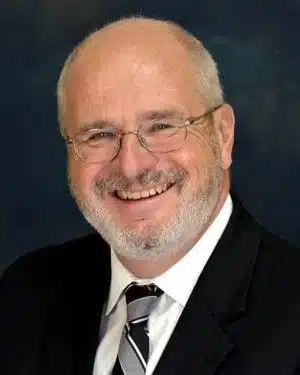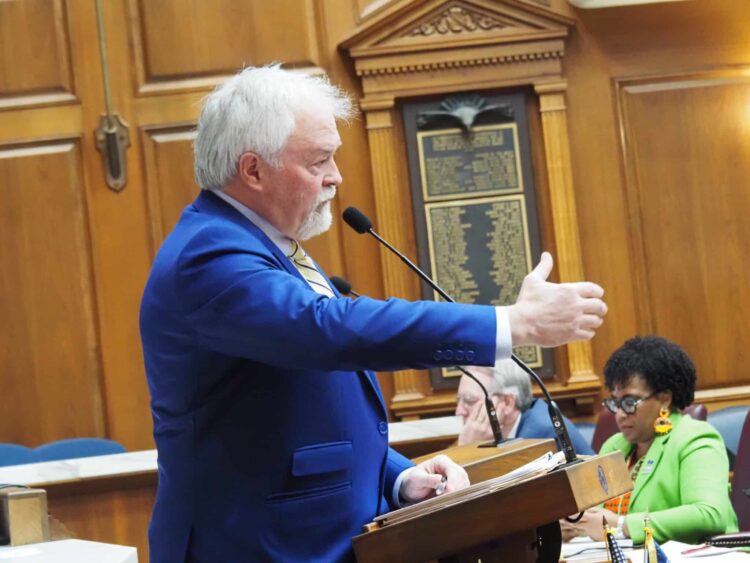Beckwith, who identifies himself as a Christian nationalist, wants to reenact the Scopes Monkey Trial in real life here in Indiana.
For those of you who slept through your U.S. history classes in school and have never seen a production of “Inherit the Wind,” the Scopes trial riveted America 100 years ago.
It focused on Tennessee high school teacher John T. Scopes’ supposed teaching of human evolution. Scopes, in fact, wasn’t certain he had taught evolution but implicated himself to challenge a Tennessee law forbidding such teaching.
The trial brought the nation’s eyes and ears to Tennessee for almost two weeks in the scorching summer of 1925. The primary attorneys for the two sides were some of the biggest names in American public life.
Clarence Darrow represented Scopes.
And William Jennings Bryan made the case against evolution.
Darrow may be the most famous courtroom lawyer in U.S. history. Bryan was the Democrats’ nominee for president three times and the most powerful orator of his era, a mesmerizing stump speaker whose “Cross of Gold” speech in 1896 electrified America and energized American populism in ways that reverberate to this day.
The climax of the trial occurred when Bryan, whose health was failing, inexplicably agreed to take the stand and subject himself to Darrow’s merciless questioning.
The result was devastating for Bryan, who died not long after the trial’s end. Darrow walked the Great Commoner, as Bryan was called, into snares that revealed the old man’s knowledge and understanding of the Bible were incomplete at best.
It didn’t matter.
Scopes lost at the trial level and was fined $100, a verdict later overturned on a technicality.
In popular memory—largely because of the enduring damage inflicted on Bryan’s reputation—the trial was a great victory for evolution, academic liberty and freedom of thought.
In truth, though, the battles over evolution, academic liberty and freedom of thought never truly ended. For the past century, there have been dustups regarding what teachers could teach in the classroom and attempts to impose creationist beliefs on science curricula.
These attempts often mischaracterize the Scopes trial, evolution itself and what Bryan himself stood for and argued.
Our misguided lieutenant governor is but the latest political huckster to deliberately misunderstand and therefore irresponsibly misrepresent all three.
Beckwith, it seems, thinks teaching evolution leads students to suicide.
In another fine story reported by The Indiana Citizen’s Sydney Byerly, we learn that our Christian nationalist lieutenant governor is determined to bring to life the late Sam Cooke’s oldie but goodie. (Disclosures: The Indiana Citizen and TheStatehouseFile.com have a partnership and Byerly is a former student of mine.)
Like the protagonist of Cooke’s tune, Beckwith “don’t know much about history” and he “don’t know much biology.”
What he does know how to do is blather on, which is what he did during an Aug. 15 podcast when he discussed evolution.
“We teach things like evolution in school, right? And evolution says we’re all animals, we’ve just evolved,” Beckwith explained. “OK, fine, if you want to teach that. But don’t be mad when kids commit suicide because all they’re doing is [telling them] they’re not strong enough to make it to the next day. We’ve taught them that survival of the fittest means the strong survive and the weak die.”
Goodness, where to start with such a heaping mess of sloppy thought.
In the first place, Beckwith is confusing social Darwinism—a system of thought that has provided moral justifications for authoritarians—with evolution, a process that takes place over millennia, not days.
Then there’s the unexamined but, from Beckwith’s perspective, self-flattering assumption that students aren’t smart enough to understand a scientific principle but can grasp a more complex theological concept such as that of a loving god who forgives sins.
In doing so, Beckwith turns himself into a caricature of William Jennings Bryan.
Bryan’s objection to evolution wasn’t primarily on scientific grounds. His quarrel was with social Darwinism and its notion that some human beings merit more consideration than others do.
If Beckwith doesn’t believe that some human beings are more entitled than others are, he certainly has no problem with cozying up to people who do believe that.
But, then again, Micah Beckwith is no William Jennings Bryan.
And this isn’t 1925.








